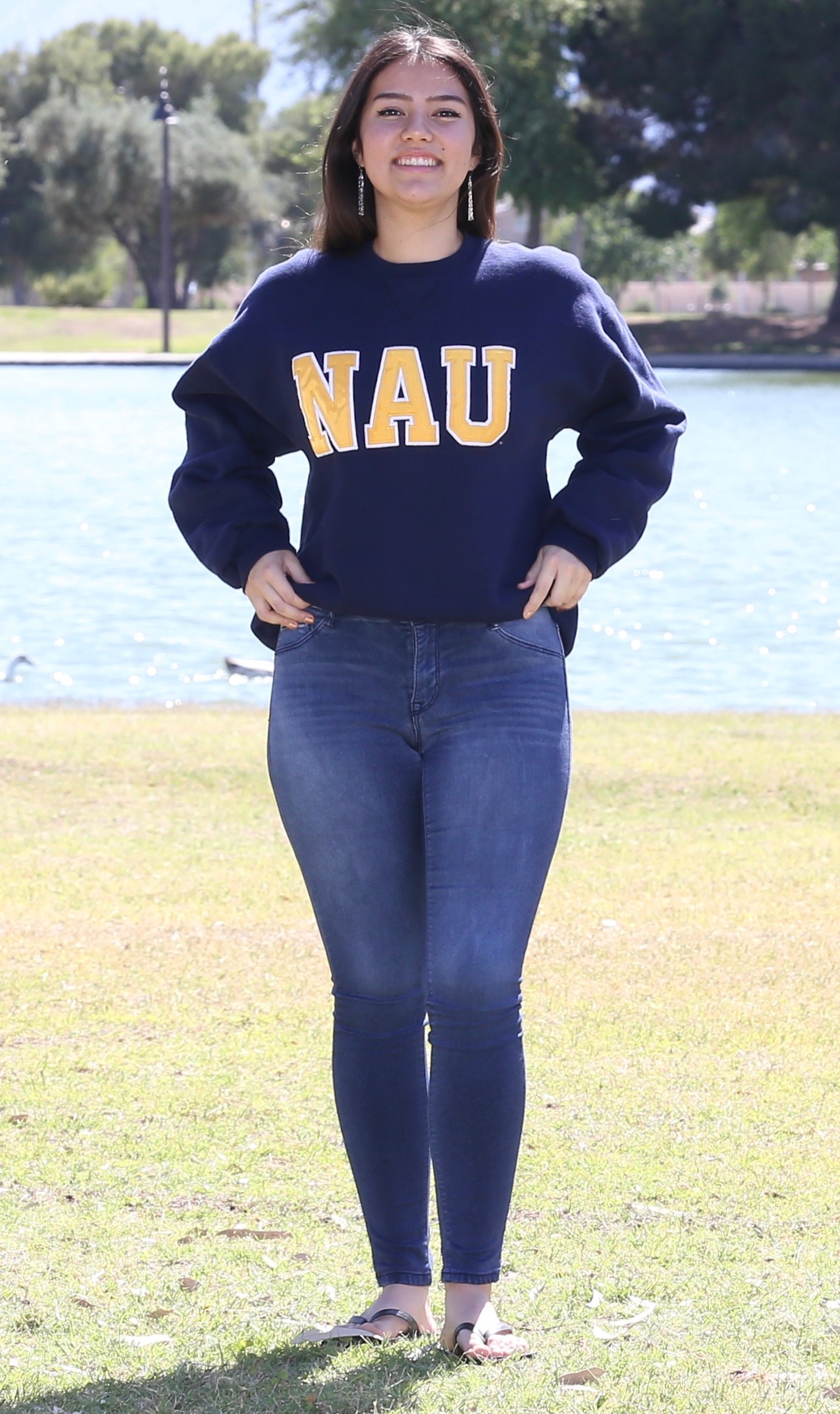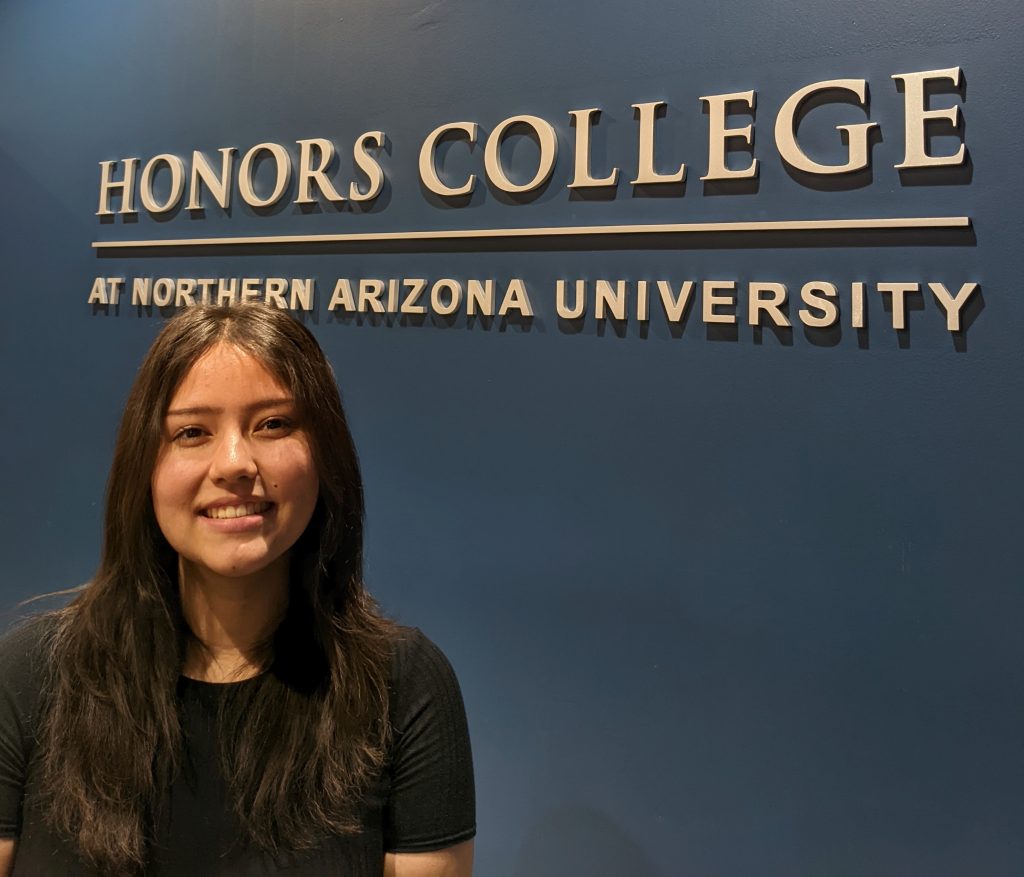Northern Arizona University junior Olivia Konig is one of the recipients of the Cobell Scholarship, a national merit-based scholarship for students who are enrolled members of a federally recognized tribe.
It’s a prestigious accomplishment for Konig, a member of the San Carlos Apache tribe who is no stranger to taking on difficult challenges. She’s in the Honors College and has two majors—international affairs and Japanese—and leaves in September for a full academic year in studying and working in Japan. She’s an Indigenous peer mentor and is preparing for law school at graduation.
Oh, and after she returns from Japan she’ll take another trip—to perform as a pianist in Carnegie Hall. Throughout her collegiate career, Konig is turning herself into the role model she wants the people coming after her to have.
“Indigenous excellence is incredibly important to me,” Konig said. “We are so underrepresented, and many of us are still dealing with the tolls of generational trauma. Scholarships like the Cobell bring recognition to powerful Indigenous people while financially aiding Indigenous students.”
Winning the Cobell Scholarship
The Cobell Scholarship honors Elouise Cobell, who was born and raised as part of the Blackfeet Nation and dedicated her life to fixing the management of trust accounts with the Bureau of Indian Affairs (BIA). She sought accountability from the U.S. government for the abuse of Indian property. In 1996, she became the lead plaintiff in a class action suit, which became the largest settlement in U.S. history. Thirteen years later, the U.S. government agreed to pay $3.4 billion for the mismanagement of individual money accounts.
Prior to the settlement, she worked as the treasurer for the Blackfeet Tribe, founded the first Native American bank, won a MacArthur genius grant, was honored as a warrior by her tribe and left a legacy for the next generation to continue her work and question “the way the world works.”
This scholarship is competitive, and the application process was almost overwhelming amid Konig’s other responsibilities. In March, she met with Andrea Graves, the coordinator of NAU’s National and International Scholarships and Fellowships Office, to talk about potential scholarships in future years. The Cobell was on her radar, but not until 2023—until she saw the 2022 deadline hadn’t passed. That was the good news. The bad news: the deadline was a few short weeks away, and the application included 17 essay prompts. Konig’s immediate response was close to panic; she just had too much else going on at the same time to be able to do this well. She reached back out to Graves, explaining she would wait until next year. Graves invited her in for a meeting.
“We met the next day and went over every prompt, and somehow Andrea pulled answers and stories from me that I didn’t realize I had,” she said. “I completed all of my essays in the last weekend before the deadline, and Andrea and my academic success coordinator read and helped me refine my application. Andrea’s enthusiasm and tremendous help is what pushed me to apply for and become a recipient of the Cobell Scholarship.”
Learn more about NAU’s 2021 Cobell Scholarship winners.

“I’m impressed by Olivia’s intrepid attitude,” she said. “When we began to work on her Cobell application in Spring 2022, she was particularly busy in her academics and her role as Honors College Indigenous Peer Mentor. She wavered on her commitment to the Cobell application in one of our early advising sessions, but she reminded me of her awareness of the tedious writing process and decided to forge ahead on her next draft. It’s that type of perseverance that creates winning national scholarship essays!”
In and out of the classroom
Konig, who is from Phoenix, chose NAU after the Honors College recruited her. She looked at the different opportunities available here, including the Interdisciplinary Global Program, and decided it was the right fit.
As a first-year student, she was assigned an Indigenous peer mentor through the Honors College. When her mentor graduated, Konig stepped up to become an Indigenous peer mentor to another Honors student. These connections are an important piece of Indigenous students’ college experience, both social and academic.
“Having peer mentors for Indigenous students is incredibly important,” she said. “University, especially predominantly white institutions, may be the first time Indigenous students are living away from their home and community. The Honors Indigenous Peer Mentoring program creates a community for these students within the Honors College.”
She also, of course, had required classes for two majors. She especially enjoyed her Japanese classes; often the same students were in class each semester, which she said creates a sense of community and familiarity in the classroom. And all of it is working toward her post-collegiate goal of law school; Konig is considering international law or Indian law, which would allow her to represent the San Carlos Apache tribe. Her mother, Justine Jimmie, is the deputy attorney general for their tribe as well as a member of NAU’s Honors Leadership Board.
Konig also has made time for her hobbies, including music. She’s been playing piano since she was 3 years old and has since picked up the clarinet, the violin (because the clarinet and piano had lost their challenge) and the cello, because her violin teacher told her she would be a good cellist.
“I hated the idea of playing cello at first, but now it’s my favorite instrument,” she said.
In high school, she also took up alto saxophone and percussion, and her first year in college she taught herself guitar. It’s more portable than the cello.
Her debut at Carnegie Hall came after years of not competing. Through high school, she played classical piano through the Phoenix Music Teachers Association, but she stopped competing after she graduated because it was harder to find competitions on her own. (Also, COVID put many competitions on hiatus.) In December, she discovered the American Protégé organization, which was accepting video performance applications. She submitted a video of herself playing and forgot about it until she got an email in February invited her to play at the storied concert hall.
Seeking success
Konig’s process worked, but she wouldn’t actually recommend it to other students—too stressful, too hurried at the end, she said. She advised other students to find those scholarship opportunities early and start working on applications right away, including contacting faculty and staff to be readers or references. It might feel overwhelming, she said, but starting early and creating a team to aid through the process will make all the difference.
“The same goes for creating a good college experience for yourself—get involved on campus and in your communities sooner rather than later,” she said. “By doing this, you give yourself the ability to create connections between faculty and friends that you can reach out to for help.”
Did you know the Office of National and International Scholarships and Fellowships is open to all NAU students? Make an appointment today to find scholarships or fellowships for which you can apply and get help in applying.



